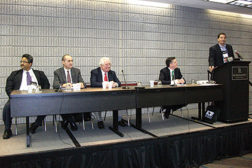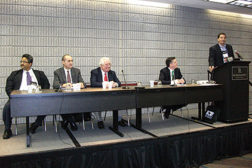Home » Commercial refrigeration
Articles Tagged with ''Commercial refrigeration''
Event Is Scheduled for Nov. 20
Read More
Oct. 24, 2014: Emerson Climate Technologies Launches E360 Initiative
Provides Customers with Resources Necessary to Stay Ahead of Issues Impacting Commercial Refrigeration
October 24, 2014
Oct. 24, 2014: DuPont Introduces New HFO Refrigerants for Commercial Refrigeration
New Refrigerants Offer Low-GWP Alternatives
October 24, 2014
Carrier Studies Natural Refrigerants in Europe
Study Decodes Key Drivers For and Against Sustainable Refrigeration
September 29, 2014
Sept. 10, 2014: Johnson Controls Offers Stainless Steel Evaporative Condenser
Unit Saves Energy, Increases Lifespan for Industrial Refrigeration Applications
September 10, 2014
Sept. 10, 2014: QM Power Receives DOE Funding to Develop Its HVAC and Refrigeration Technology
Awards Will Help in Advancing Energy-Saving Technology
September 10, 2014
Aug. 4, 2014: New Embraco Compressor Handles Two Different Commercial Refrigeration Applications
Unit Provides Energy Efficiency Gains of Up to 9 Percent
August 4, 2014
A Global Look at Refrigeration Challenges
Developed, Developing Countries Differ in Accessibility
Read More
A Global Look at Refrigeration Challenges
Developed, Developing Countries Differ in Accessibility
Read More
Copyright ©2024. All Rights Reserved BNP Media.
Design, CMS, Hosting & Web Development :: ePublishing




